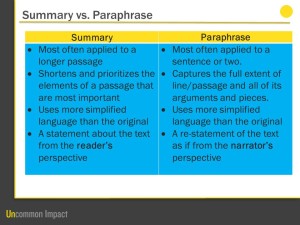03.09.16On the Difference Between Paraphrase & Summary
Paraphrase, Colleen, Erica and I point out in Reading Reconsidered, is not the same as summary. A paraphrase is a restatement of the sentence in simpler, clarified terms that still capture all of the explicit meaning and as much of the connotation as possible.

A paraphrase recreates a facsimile of the passage from the narrator’s point of view. A summary describes the passage from the reader’s point of view.
In the book, we use the example of this short passage from To Kill a Mockingbird in which Scout is talking about her Aunt Alexandra who speaks a coded language about the importance of heredity:
I have never understood her preoccupation with heredity. Somewhere, I had received the impression that Fine Folks were people who did the best with the sense they had, but Aunt Alexandra was of the opinion, obliquely expressed, that the longer a family had been squatting on one patch of land the finer it was.
We observed that writing something like, “Scout is reflecting on her interpretation of how class was determined, as contrasted to that of her Aunt Alexandra” is not a paraphrase but rather a summary. A paraphrase would not describe the passage but replicate it- it would be written in the first person and take on Scout’s point of view. It might start: “Somehow I had come to believe that respectable people were . . .”
In addition to that a good paraphrase would:
- Restate all parts of the excerpt in new words—the hard parts as well as the easy parts; the key ideas and the sub-textual ones
- Mimic the excerpt’s Point of View, perspective and tense (First person versus third person, say; past versus present)
- Match the excerpt’s tone the degree possible
So it might sound something like this:
“I had come to believe, though I’m not sure when or how, that people of stature were people who lived as wisely and well as they could given their circumstances but Aunt Alexandra believed, though she wouldn’t come out and say it directly, that status was based on how long you had been living on your land.”
Paraphrasing might seem to some like the most straightforward and mundane of activities—banal, even, but if you try to do all of the things we describe to the passage from To Kill a Mockingbird you would likely find that paraphrasing a worthy segment of complex text is a rigorous task. What does it mean that Aunt Alexandra’s opinions about race and class were “obliquely expressed”? What does “Fine Folks” mean and why is it capitalized?
Paraphrasing is a worthy and challenging passage is a worth task in teaching students to deal with challenging text. In light of that our colleague, Maggie Johnson, put together this training activity.
Close Reading_Paraphrase Activity_2.9
It’s designed to allow teachers to reflect on the difference between paraphrase and summary and to prepare to use them (differently) in their classrooms. I thought I’d share it here in case you found it useful.
